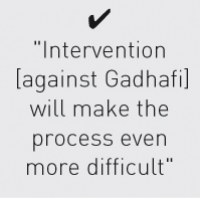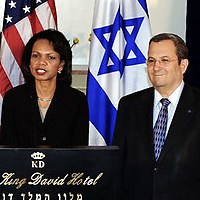![]()
Tue, Aug 30, 2011 | WikiLeaks

Mubarak during one of his speeches at the beginning of the Egyptian Revolution still hoping to turn the tide in his favour (feb 2, 2011)
WikiLeaks: Next Steps for Advancing Democracy in Egypt
At the time of the Bush administration, this 2006 March cable starts with “sometime in the next six years, Egypt will undergo a leadership succession.” As we now know that was a correct prediction, but not in the way originally anticipated.
“There will be no ‘Orange Revolution on the Nile’ on Mubarak’s watch,” this cable claims and draws the conclusion that “in all likelihood, it will not be possible to make great progress on democratic reform as long as President Mubarak remains in office. Nonetheless, his firm rule offers space and time to prepare civil society and some institutions of the GOE for the day of his departure.”
In order to make Mubarak’s succession succesfull the Bush’s (and after that Obama’s) administration should have pushed for:
— a representative government that will secure Egyptian stability, prosperity, and friendship for a generation
— economic reforms that will improve the living standards of the Egyptians
— the regime to broaden its agenda to include electoral, media, police, law and anti-corruption reform
— planting the seeds of transformation within the military, because Egypt’s military still expects to inherit the Presidency
— broaden US diplomatic strategy to build support for the democracy agenda among regime elites
— Egypt’s government to fill the void in public services
— legalizing “liberal and democratic” political parties to fill the void in political space left by the absence of any meaningful opposition aside from the — Islamist — Muslim Brotherhood
This didn’t happen. And so began the Egyptian Revolution on 25 January, 2011, when tens of thousands of Egyptians took to the streets of Cairo to protest police brutality and Mubarak’s regime collapsed.
Source: WikiLeaks
Reference Created Classification Origin 06CAIRO1351 2006-03-06 12:41 CONFIDENTIAL Embassy Cairo
This record is a partial extract of the original cable. The full text of the original cable is not available.
C O N F I D E N T I A L SECTION 01 OF 04 CAIRO 001351
SIPDIS
NEA FOR A/S WELCH, PDAS CHENEY, DAS CARPENTER
NEA FOR ELA
NSC FOR DNSA ABRAMS
TUNIS FOR MEPI (MULREAN)E.O. 12958: DECL: 03/06/2016
TAGS: PGOV KDEM EG
SUBJECT: NEXT STEPS FOR ADVANCING DEMOCRACY IN EGYPTClassified by Ambassador Francis J. Ricciardone for reasons
1.4 (b) and (d).¶1. (C) Summary and Introduction: Sometime in the next six
years, Egypt will undergo a leadership succession. The
United States’ goals for this succession should be to promote
an opening to establish a representative government that will
secure Egyptian stability, prosperity, and friendship for a
generation. There is scant movement in that direction now.
Whether or not 77-year old Hosni Mubarak survives his
six-year term, his regime is ossifying and increasingly out
of touch. His enlightened economic cabinet has a negligible
political base and gets little credit outside of elite
circles. The National Democratic Party’s popularity is in
decline. The military still expects to inherit the
Presidency. But the Muslim Brotherhood’s confidence is
growing.¶2. (C) Egyptians want reform, or at least an end to
stagnation. The disagreements arise over breadth and speed.
Egyptians care more deeply about reforms that will improve
their living standards–and they are growing less patient.
But the GOE insists on its own pace: moderately slow for
economic reforms, glacial for political opening. With no
elections for the next fifteen months, the high visibility
focus of our democracy strategy needs replacement. President
Mubarak’s proposed reform program, as stated in his campaign
promises and subsequent speeches, although modest, provides
the starting point for USG engagement. In addition, we
should:–Urge the regime to broaden its agenda to include electoral,
media, police, and anti-corruption reform–and at least begin
planting the seeds of transformation within the military.–Continue to help the legal political parties through IRI
and NDI, with a focus on the ruling NDP.–Continue USG support through USAID and MEPI to Egyptian
civil society, including advocacy for structural reforms
through key legislation and technical assistance.–Ensure the political success of the economic reform program
and review our military assistance program with a focus on
IMET.–Broaden our diplomatic strategy to build support for the
democracy agenda among regime elites, including the First
Lady. End introduction and summary.———–
Assumptions
———–¶3. (C) Proposed next steps are based on the following
assumptions:–Mubarak remains our indispensable regional ally but will
move too slowly on the reform agenda. Reforms not blessed by
Mubarak will not be achievable during the remainder of his
rule.–The NDP will remain the dominant political party in Egypt
with control over the parliament through 2011. The party
leaders themselves recognize that its “popularity” is based
almost entirely on patronage and control of the security
apparatus; internal reforms are needed, but breaking with old
habits and entrenched interests will be slow and difficult.–The Muslim Brotherhood’s appeal will grow as long as it
continues to fill the void in public services left by
government, and the void in political space left by the
absence of any other meaningful opposition.–The Brotherhood’s parliamentary election success–which
confirmed both its organizational skills and popular
appeal–has entrenched GOE resistance to electoral reform.–Civil Society elites will remain engaged in reform
discussions but without influence or capacity to effect
meaningful systemic change before Mubarak leaves office.–The economic cabinet will remain in place but will be
reluctant to tackle aggressively painful steps, such as
rationalizing subsidies. Economic reform has not yet
benefitted the Egyptian “street.”–The Emergency Law will be extended in May 2006 for
twenty-four months; the parliament will continue to work on a
replacement anti-terror law ostensibly modeled on western
statutes that will stress state security requirements rather
than the protection of individual liberties.–The security apparatus will resist change on the grounds
that it is de-stabilizing. The military will be a drag on
reform but will not actively engage unless its economic
equities are threatened or it perceives a serious threat to
stability.———-
Next Steps
———-¶4. (C) Extend ESF-funded technical assistance to GOE
ministries and the parliament to sustain and, if possible, to
accelerate and expand the Mubarak political reform program.
Stated GOE goals include the following:— Replace emergency law with anti-terror legislation,
modeled on western anti-terror statutes.— Seek Parliamentary input on constitutional reform.
— New judicial authority law.
— Amending the press law, including eliminating the
imprisonment penalty for defamation (to protect journalists).— New law amending criminal procedures, including
provisional detention.— New law aimed at supporting decentralization and
strengthening elected local councils’ supervisory roles.We currently have no direct cooperation with the Parliament.
Previous support has foundered on Egyptian efforts to use
assistance as patronage. Assistance should be low-key;
emphasis should be on the technical. We can provide much
information assistance through normal mission resources, at
minimal cost, outside of USAID programs. We should also
ensure coordination between technical assistance and pilot
programs already underway in the field. For example, efforts
on decentralization legislation should benefit from USAID’s
existing work with governorate-level councils. We can use
normal advocacy measures to support reformers pressing for
higher-end reforms than Mubarak now seems to envision, e.g.,
supporting Governors who advocate constitutional change to
permit local election of Governors.¶5. (C) Pressing the GOE to expand its reform agenda to
include major electoral, media, and police reform, and
anti-corruption:–On elections, we favor establishment of an independent
electoral commission, based on the Iraqi model. Given GOE
ambivalence, we should use speakers programs, IVs and other
indirect messaging to promote this idea, until it is adopted
as “Egyptian.” IFES also proposes an ambitious civil society
focused project to build domestic support for electoral
reform.–USAID has already embarked on a $16 million program to
support private media and encourage media privatization.
This effort was dealt a setback when Mubarak himself told
journalists on March 1 that state-owned newspapers would not
be privatized. Nonetheless we should engage the cabinet and
the parliamentary leaders on public sector media reform, even
as we find ways to support private media.–On police reform, DS and S/CT have presented a proposal for
counter-terrorism training that would expand our in-country
cooperation. Post has also solicited an INL proposal for a
Strategic Leadership Course for senior police commanders
aimed at promoting community policing, regard for human
rights and developing a more professional police corps.
Deployment of in-country police and Justice attaches could
promote new levels of law enforcement cooperation. The
Ministry of Interior and perhaps the Presidency are opposed
to what they regard as a covert intelligence effort, but Mrs.
Mubarak has pressed MOI to accept more U.S. “transformational
police training.” We should continue to seek an arrangement
that will address their concerns.–The GOE needs to pursue a meaningful anti-corruption
program if it wishes to take this cudgel away from the MB.
We can provide technical assistance and public affairs
programming. Global metrics are readily available.¶6. (C) Technical support to legal political parties through
IRI and NDI: Having assessed the elections, the institutes
now recognize what the parties need. The NDP will likely not
participate with other parties in the room, so it may be
necessary to develop separate tracks in the program for the
ruling party and the opposition. Even with the NDP on board,
we can expect blowback by anti-reform elements. The
institutes should keep their programs low-key and the USG
apprised. Their programs should incorporate the full range
of Egypt’s civil rights priorities, such as bringing more
women and Christians into the political process. The 2007
Shura elections and the 2008 local council elections–and the
development of the legislation promised to reform the
later–will be the key medium-term tests. In addition to
continued support for international implementers like NDI and
IRI, we should also proceed with supporting additional
engagement on Egypt by additional international NGOs such as
Transparency International, Freedom House, and the American
Bar Association.¶7. (C) Continue USAID’s and MEPI’s work with civil society
organizations: The Ibn Khaldun Center and others produced
impressive results on domestic monitoring during the
parliamentary elections and merit continued support. With no
elections for fifteen months, these groups need a new focus.
The next phase should bring civil society into a process for
identifying new priorities and concerted action. This must
be an Egyptian process, but we should advocate our
priorities, such as human rights, religious freedom, women’s
and children’s rights (including female education), and
involvement by the citizenry in local education policy.
USAID’s new Family Justice Program will engage NGOs to raise
public awareness about the legal rights of women and
children, as well as the legal services available to these
disadvantaged groups. These efforts will also face
reactionary criticism of “bribery” and “meddling.”¶8. (C) Recognize that economic reforms complement
democratic reform: We should revitalize the Free Trade
Agreement and move forward with notification to Congress at
the earliest possible political opening. Failing that, we
should develop new programs to maximize the benefits of the
QIZs. The biggest challenge facing Egyptian manufacturers in
the QIZ program is finding Israeli content. Expanding
outlets for Israeli content would create Egyptian jobs and
exports. USAID could usefully study how to optimize the QIZ
benefit. USAID should also continue work with the Egyptian
economic cabinet on tackling subsidies in a politically
sensitive manner. The current initiative to shift USAID
economic support to “sectoral reform programs” linked to
several benchmarks, including democratization, can play a key
role.¶9. (C) Initiate an internal long-range review of U.S.
military assistance: This issue requires much further
discussion but we need to define the linkages between our
military assistance program and Egypt’s progress towards
representative government. At a minimum, this review should
expand IMET programs–the most purposefully “transformative”
form of U.S. military assistance–to bring more Egyptian
officers for training in the United States.——————-
Diplomatic Strategy
——————-¶10. (C) In addition to programmatic steps, we need a fresh
approach with Mubarak. He resents and ridicules the U.S.
reform agenda. We should aim at influencing the narrow group
of individuals that surround him. These are: EGIS Chief
Omar Soliman, Presidential Chief of Staff Zakariya Azmi,
Prime Minister Ahmed Nazif, and Gamal and Suzanne Mubarak.
(The older Mubarak son Alaa has apparently renounced
politics.) Of these key players, the person with whom we
have the least contact is Suzanne Mubarak. In her meetings
with the Ambassador, the Egyptian First Lady has expressed
concern over Egypt’s standing abroad and acknowledged the
importance of, for example, police reform. It was Mrs.
Mubarak that persuaded the Ministry of Interior to change
course and allow UNHCR to have access to Sudanese
asylum-seekers detained after the December 30 tragedy. More
than an advisor, she is a shrewd political player in her own
right, and is able to promote a range of programs, most
recently to combat trafficking in persons. Mrs. Mubarak will
not take on the nuts and bolts of reform, but she could
strengthen the political reform wing of the leadership. The
one-year anniversary of the FLOTUS visit to Egypt will be in
May. It would be gracious and possibly productive to invite
Mrs. Mubarak to the White House for a return visit.——————-
Whither the Ikhwan?
——————-¶11. (C) The Brotherhood remains a major challenge. In many
ways, it is Egypt’s essential civil society, having been
working in the fields of social welfare and citizen
mobilization since its founding in 1928. Its impressive
political mobilization skills, demonstrated in its success
rate in the 2005 parliamentary elections (88 seats won out of
150 contested), put the NDP and the other opposition to
shame. We cannot engage directly with the Brotherhood, but
we must urge the GOE to find a formula that can co-opt, win
over, or otherwise effectively thwart the direct threat of
the Brotherhood. We have been trying to persuade influential
Egyptians that the GOE/NDP tactics toward the MB (stop/start
repression) is failing, and that they should confront the
MB’s ideology head-on, with direct debate by articulate
secularists. The GOE also could press the MB by posing a
number of key wedge issues (QIZs, regional peace, women’s
rights, religious minorities, FTA, etc.) as a price for
legalization. Another (possibly tandem) tack would be to
consider a Track II approach that would send ex-USG officials
to meetings with the MB leadership in neutral places to gauge
the depth of the MB’s commitment to democratic reform.———-
Conclusion
———-¶12. (C) In all likelihood, it will not be possible to make
great progress on democratic reform as long as President
Mubarak remains in office. Nonetheless, his firm rule offers
space and time to prepare civil society and some institutions
of the GOE for the day of his departure. These proposals
have the advantage of establishing a stronger framework for
cooperation on political action and reform across the
political spectrum for the years ahead, and positioning us to
create and take advantage of any opportunities. We do not
have a silver bullet, but we can press reforms that will
lead, inexorably, to the “death by 1000 cuts” of Egypt’s
authoritarian system. There will be no “Orange Revolution on
the Nile” on Mubarak’s watch, but we must aim to consolidate
each modest democratic advance. A steady, incremental
approach will continue to stretch Egypt toward a democratic
future.RICCIARDONE



 RSS
RSS











WikiLeaks: Next Steps for Advancing Democracy in Egypt | Middle East, Israel, Arab World, Southwest. http://t.co/ToAlCLHB
WikiLeaks: Next Steps for Advancing Democracy in Egypt | Middle East, Israel, Arab World, Southwest. http://t.co/ToAlCLHB
State Department cable from 2006: Next Steps for Advancing Democracy in Egypt. #WikiLeaks #Cablegate http://t.co/ZnjUga53